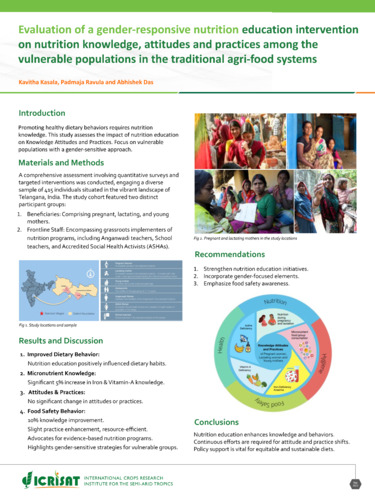Evaluation of a gender-responsive nutrition education intervention on nutrition knowledge, attitudes and practices among the vulnerable populations in the traditional agri-food systems
Abstract
Nutrition knowledge plays a crucial role in promoting healthy dietary behaviors among communities. We aimed to evaluate the outcome of nutrition education interventions on nutrition knowledge, attitudes and practices, and provide an evidence base for targeting nutrition programs among the vulnerable population using a gender lens. Quantitative surveys and interventions were conducted with a sample of 415 individuals in Telangana, India. The sample included two groups of participants—beneficiaries of the targeted national nutrition programs (pregnant women, lactating mothers and young mothers) and frontline staff who implement the nutrition programs at the grass root level (Anganwadi teachers, school teachers and accredited social health activists). Based on the statistical analysis, it was found that nutrition education improved the dietary behavior of the participants. The knowledge levels regarding the micronutrients of iron and Vitamin A in diets improved significantly at 5%, but there was no change in the attitudes and practices among both the groups. In the case of an education intervention on food safety behavior, the knowledge levels significantly (10%) improved for both groups. Alongside this, the practice scores improved slightly after the education intervention in both the categories of participants because food safety practices can be easily implemented with minimal resources. Lack of knowledge about nutritional needs, as evident from this study, emphasizes the ever-increasing need for policies on the importance of nutrition education and training at all levels toward improving equitable and sustainable healthy diets in traditional agri-food systems.

